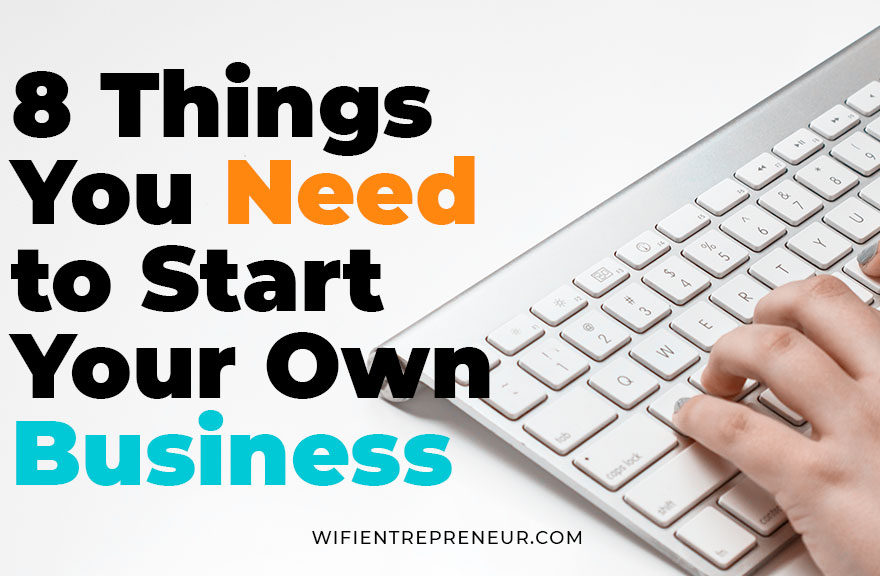Even wondered what is it that you need to start your own business? Here is a brief list of the absolute essentials. So jumping right in.
1. A Powerful Message
Successful businesses are those that address a problem that needs solving and offer a solution for it. Also, you need to make it clear. You need to have a powerful message about what customer problem you are going to solve with your product or service. This is often called the value proposition.
2. A Targeted Audience
Before you can create a powerful message, it’s important to determine exactly who it will be addressed to. It is much easier to strengthen your message when you are focused on your target audience. If you aren’t clear about the specific audience you want to work for, you necessarily need to figure it out before you develop your message, build your website, or write your first email. Generic messages, marketing strategies, advertising campaigns that try to reach a broad audience never work. Although as a small business owner you may be tempted to reach as many potential customers as possible, it won’t be an effective strategy.
Focus on a narrow market. It will enable you to build a loyal customer base that will be far more likely to pay for your products and services because they are specifically targeted at them.
3. Understanding Of The Market
Having the best idea won’t be just enough. There are many examples of companies that do not have the best product/service or are not first to market, yet are dry successful because they have mastered marketing and sales.
Marketing research is essential: find out what your customers need (use forums and keywords research), who are your competitors, and how they are working. How are they solving the customer’s problem? How do they reach their potential customers? Learn from your competitors and try to offer a better service/product.
4. A Mentor
Launching and growing a business difficult and more than a half will fail. No person can have all the knowledge and experience to handle every business situation. Gain as much as you can from others’ skills and experience. What you need is a sort of mentor to follow. A mentor doesn’t have to be necessarily someone you know. Many of us don’t know anyone who owns a business or that has started one from zero and brought it to success. Your mentor could be a community of entrepreneurs like you, a training center. A place where you can find all the advice and support you need.
5. A Business Plan
After you have chosen what type of business you will have (sole proprietorship, partnership, corporation, or LLC), you need to put together a business plan. Having a written business plan with your aimed goals clarified is the best way to stay on track.
A business plan contains five key elements:
- Your business goals
- The reasons why these goals are attainable
- A plan for reaching those goals
- Data describing the uniqueness of the products or services to be sold
- Supporting information about the organization and team that work to achieve these goals.
During the process of writing your business plan, you also have the chance to develop a set of messages, based on facts and analysis, that you can use in discussions with customers, partners, and advisers. Yet, you are not writing your plan to seek funding or allure, business partners. A business plan is mainly written for yourself, to help set your goals, decide whether to start or grow a business, and develop a compelling message of why and how you are going to be successful.

6. Balance sheet
Before starting your own business you need to have a complete understanding of your numbers. This means that you have to calculate the initial investment, the money you’d need to cover your expenses for at least the first year, how many items or subscription to your service you’ll need to sell to cover for those expenses. A balance sheet would be extremely useful for this purpose.
A balance sheet is one statement used to monitor the health of your business. You can think of it as a snapshot of your company’s financial position: what you own and what you owe.
The things you own are called assets: cash in the bank, inventory, equipment, accounts receivable (the money the customers owe you for sales made but not yet paid for) are your assets.
The items you owe are called liabilities: accounts payable (the purchases you have made but not yet paid for), taxes you owe, payroll, general purpose loans are your liabilities.
The difference between your assets and your liabilities is called net worth or owner’s equity. It basically corresponds to your income: after all the bills have been paid and all obligations have been satisfied, any value remaining belongs to the owner.

7. Passion
Being a business founder can be very lonely. You’ll be having a lot to learn and to do every day. Sometimes it will feel like there are not enough hours in the day to accomplish everything. From big successes to large letdowns, if you’re not fuelled by passion at every step of your journey your job can become much harder. Remember why you started your business and let your passion drive you one day, one success and one failure after the other.
8. Proper Training
In order to achieve your goals, you’ll need to work hard. Being a small business owner can have lots of advantages but it is also one of the hardest jobs around. You need to know what you are doing at every step of the process. Hard work would be important and so would be your training. Improvising yourself as a business owner won’t be a good idea.
Do your research, join a professional training center. You are not obliged to spend a lot of money for the education you need: there are some free training centers available that can provide you with any information you need about what you need to start your own business.


